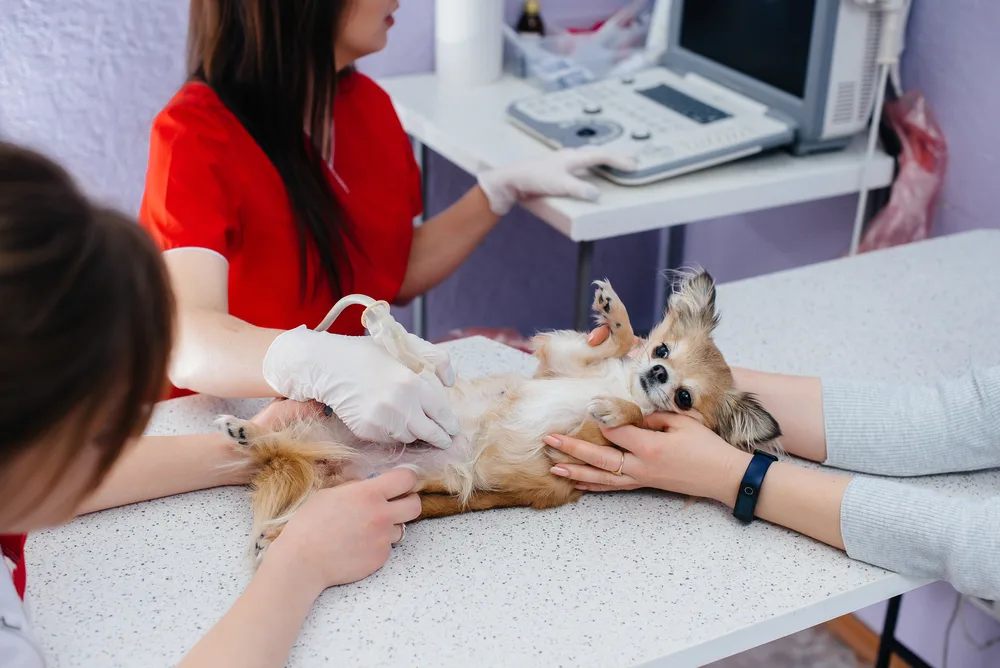
Cathy Bendzunas
Pet Blogger
Hey fellow Chihuahua lovers! If you have a cute little Chi, you know these tiny pals sometimes face some big health challenges.

One important area to understand is their neurological health – you know, all the brain and nerve stuff. Knowing the signs of troubles can help you get them sorted early, keeping your fur baby happy and healthy.
Symptoms of Neurological Problems in Chihuahuas
If your Chihuahua is experiencing neurological problems, there are several symptoms you should look out for.
Some of the most common symptoms of neurological problems in Chihuahuas include:
- Seizures: Seizures are one of the most common symptoms of neurological problems in Chihuahuas. They can range from mild to severe and may cause your dog to lose consciousness, have muscle spasms, or even fall over.
- Tremors: Tremors are another common symptom of neurological problems in Chihuahuas. They can be mild or severe and may affect your dog’s ability to walk or stand.
- Loss of coordination: If your Chihuahua is experiencing a loss of coordination, they may have difficulty walking or standing upright. They may also have trouble controlling their movements.
- Paralysis: In severe cases, neurological problems can cause paralysis in Chihuahuas. This can affect one or more limbs and may be temporary or permanent.
- Behavioral changes: Neurological problems can also cause behavioral changes in Chihuahuas. Your dog may become more aggressive, anxious, or depressed.
Types of Neurological Issues
One common thing is seizures, and there are different triggers for them, including epilepsy, injuries, or infections. When this happens, your pup might experience convulsions, muscle spasms, and sometimes a loss of consciousness.
Scary, right? Don’t wait if this happens – get to the vet immediately.

Watch Out for Hydrocephalus
Another condition to watch out for is Hydrocephalus, or ‘water on the brain’. It’s sadly more common in our Chi friends.
It can lead to symptoms like a swollen head and difficulty walking. You will most likely see this when your dog is a puppy.
IVDD – Not a Cool Acronym
Another biggie is Intervertebral Disc Disease (IVDD). It happens when the discs between the spine’s vertebrae get damaged. It causes pain, can mess with bladder and bowel control, and in severe cases, even paralysis.
Head Injuries
Chihuahuas have small heads and are prone to head injuries. These injuries can cause neurological problems such as seizures, loss of consciousness, and difficulty walking.
If your Chihuahua experiences a head injury, it’s important to seek veterinary care immediately.

Diagnosing Neurological Disorders
When your Chihuahua is experiencing neurological problems, it can be difficult to determine the cause. Diagnosing neurological disorders requires a thorough physical examination, neurological examination, and diagnostic imaging.
Physical Examination
During the physical examination, your vet will look for any signs of pain, discomfort, or injury. They will also check your Chihuahua’s vital signs, such as heart rate and temperature, to ensure they are within a normal range.
Additionally, they may examine your dog’s eyes, ears, and nose for any abnormalities.
Neurological Examination
The neurological examination evaluates your Chihuahua’s nervous system. This includes assessing their reflexes, muscle tone, and coordination. Your vet will also check your dog’s gait and how they respond to stimuli, such as touch or sound.
This examination helps determine the location and extent of any neurological damage.

Diagnostic Imaging
Diagnostic imaging, such as X-rays, CT scans, or MRIs, may be necessary to identify the underlying cause of your Chihuahua’s neurological problems. These imaging tests can reveal any abnormalities in the brain, spinal cord, or nerves.
Your vet may also perform a spinal tap, which involves removing a small amount of cerebrospinal fluid to test for infections or inflammation.
Overall, diagnosing neurological disorders in Chihuahuas requires a thorough examination and diagnostic testing. If you suspect your Chihuahua is experiencing neurological problems, it is important to seek veterinary care as soon as possible.
Treating Neurological Problems in Chihuahuas
When it comes to treating neurological problems in Chihuahuas, a casual chat with your vet is usually the first step. They’re your guide to understanding what’s going on inside your fur baby’s little head and can offer various treatment options to manage or treat the condition.
So, if your Chihuahua is diagnosed with something like hydrocephalus, a condition where there’s excess fluid in the brain, the vet might suggest medications to manage symptoms or, in severe cases, surgery to alleviate pressure.
It sounds a bit scary, but don’t worry! Many pups go on to live happily and healthily with the right care and treatment.
For those tiny tremors and seizures, your vet might recommend medications to manage them. It’s all about finding the right balance that helps your Chi lead a comfortable life.
Some fur parents also find that a change in diet and lifestyle can work wonders. Regular check-ups are crucial; they help monitor your pet’s condition and adjust treatments as needed.
Don’t forget the importance of love and comfort! A stress-free environment, plenty of cuddles, and a cozy bed can make a world of difference to a Chihuahua dealing with neurological issues.
Keep those tails wagging with plenty of playtime and affection, and you’ll have a happy, lively companion despite the neurological quirks.
Preventing Neuro Problems in Your Chihuahua
Preventing these issues is obviously better than treating them. Regular vet check-ups, proper nutrition, regular exercise, avoiding trauma, and keeping up with vaccinations are paramount in keeping your Chi healthy.
Living with a Chi with Neuro Problems
Having a Chi with neuro issues can be tough but remember, your love and patience can make their lives wonderful. Regular check-ups, creating a safe environment, monitoring their behavior, and considering alternative therapies like acupuncture are things you can do to help manage symptoms.

Final Thoughts
Having a Chihuahua means being on the lookout for signs of trouble, especially neurological ones, due to their susceptibility. Remember, early diagnosis can be a lifesaver. It’s all about understanding their unique needs and working hand-in-paw with your vet to keep them wagging their tails happily! Keep your home safe, and be patient. It may require some extra TLC, but seeing them happy and healthy is worth every bit of it!
Remember!
-
- Early detection is key. Don’t delay if you suspect something is off!
-
- Your vet is your partner in keeping your Chi healthy.
-
- Preventive care, like proper nutrition and vaccinations, can help avoid many problems.
-
- Alternative therapies can also be considered in managing symptoms.
-
- And most importantly, every Chihuahua is different – patience, love, and care are crucial in ensuring a happy and healthy life for your furry pal!
Sending Paw-sitive Vibes!
Keep showering your little furry pals with love and keep them healthy and joyful! ????

Frequently Asked Questions
Chihuahuas are more prone to neurological problems than other breeds due to their small size and delicate nature. They are predisposed to conditions such as hydrocephalus, seizures, and tick paralysis.
The recovery from neurological problems in dogs depends on the severity of the condition and the underlying cause. Some dogs may recover fully with treatment, while others may require ongoing care and management. It’s important to work closely with your veterinarian to develop an appropriate treatment plan for your Chihuahua.

